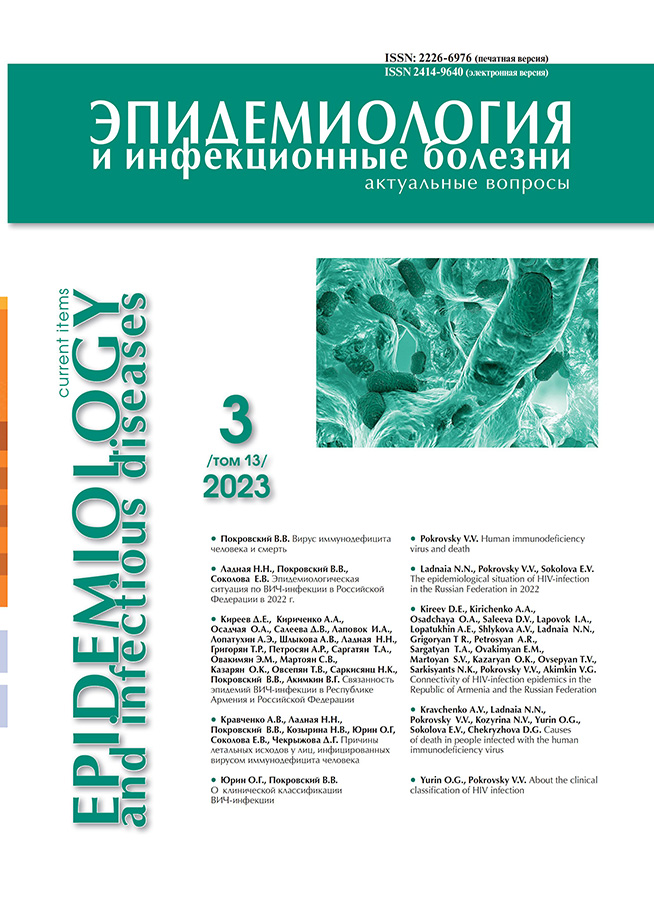Risk behaviors and HIV infection among homosexual men in St. Petersburg
- Authors: Piskarev I.G.1, Eritsyan K.Y.2, Shagina A.B.3, Petrova V.G.1, Vinogradova T.N.1, Usacheva N.M.4
-
Affiliations:
- Center for AIDS and Infectious Diseases
- Herzen State Pedagogical University
- St. Petersburg Charitable Foundation «Humanitarian Action»
- St. Petersburg State University
- Issue: Vol 13, No 3 (2023)
- Pages: 43-48
- Section: Original Investigations
- Published: 30.12.2023
- URL: https://journals.eco-vector.com/2226-6976/article/view/625015
- DOI: https://doi.org/10.18565/epidem.2023.13.3.43–8
- ID: 625015
Cite item
Abstract
Objective. Assessment of the epidemiological significance of a group of homosexual men in the spread of HIV infection in St. Petersburg.
Materials and methods. An integrated biobehavioral study among 400 homosexual men was conducted in 2022 during outreach visits to leisure places specialized for the group and in medical clinics in St. Petersburg.
Results. HIV prevalence was 7.8%, which is comparable to previous studies among homosexual men. The incidence is estimated at 2.1%. The group is characterized by high levels of awareness about HIV infection, coverage with testing and preventive interventions, as well as self-treatment. At the same time, every fourth HIV-positive man is not informed about his status. At the same time, the homosexual group is still characterized by a wide range and high prevalence of various risky sexual practices.
Conclusion. Prevention programs for homosexual men should take into account their behavioral and cognitive characteristics, focus on gaps in awareness of specific prevention opportunities and behavior change. It is also advisable to include services in the field of mental health and addictive behavior in preventive programs.
Full Text
About the authors
Igor G. Piskarev
Center for AIDS and Infectious Diseases
Author for correspondence.
Email: igor-doctor@mail.ru
Head, Department of Prevention and Medical and Social Work
Russian Federation, Saint PetersburgKsenia Yu. Eritsyan
Herzen State Pedagogical University
Email: ksenia.eritsyan@gmail.com
ORCID iD: 0000-0002-4400-0593
Cand. Psychol, Sci., Researcher, Laboratory of Cognitive Research in Education
Russian Federation, Saint PetersburgAlesya B. Shagina
St. Petersburg Charitable Foundation «Humanitarian Action»
Email: sagina@haf-spb.org
Program Manager
Russian Federation, Saint PetersburgVeronika G. Petrova
Center for AIDS and Infectious Diseases
Email: veronikaepid@yandex.ru
Methodologist, Department of Prevention and Medical and Social Work
Russian Federation, Saint PetersburgTatyana N. Vinogradova
Center for AIDS and Infectious Diseases
Email: vino75@mail.ru
ORCID iD: 0000-0003-1995-4755
Cand. Med. Sci., Chief Physician
Russian Federation, Saint PetersburgNina M. Usacheva
St. Petersburg State University
Email: n.usacheva@spbu.ru
ORCID iD: 0000-0001-8722-3976
Chief Specialist, RC «Center for Applied Sociology»
Russian Federation, Saint PetersburgReferences
- В ОПАСНОСТИ: Глобальный доклад ЮНЭЙДС по СПИДу 2022. Женева: Объединенная программа Организации Объединенных Наций по ВИЧ/СПИДу. Лицензия: CC BY-NC-SA 3.0 IGO. https://www.unaids.org/sites/default/files/mediaasset/2022-global-aids-update summary_ru.pdf [IN DANGER: UNAIDS Global AIDS Update 2022. Geneva: Joint United Nations Programme on HIV/ AIDS; 2022. Licence: CC BY-NC-SA 3.0 IGO]. (In Russ.). https://www.unaids.org/sites/default/files/mediaasset/ 2022-global-aids-update_en.pdf
- Федеральный научно-методический центр по профилактике и борьбе со СПИД. Бюллетень № 46 «ВИЧ-инфекция 2020 г.». http://www.hivrussia. info/wp-content/uploads/2022/05/Byulleten-46-VICH-infektsiya-za-2020-g.-.pdf. [Federal Scientific and Methodological Center for Combating AIDS. Bulletin № 46 «HIV Infection 2020»]. (In Russ.). http://www. hivrussia.info/wp-content/uploads/2022/05/Byulleten-46-VICH-infektsiya-za-2020-g.-.pdf
- Плавинский С.Л., Ладная Н.Н., Баринова А.Н., Зайцева Е.Е. Эпидемиологический надзор II поколения за ВИЧ-инфекцией. Распространенность ВИЧ–инфекции и рискованного поведения среди уязвимых групп населения в 7 регионах Российской Федерации, результаты биоповеденческого исследования. 2017 г. http://www. hivrussia.info/wp-content/uploads/2019/05/Biopovedencheskoe-issledovanie-v-7-gorodah-2017.pdf Plavinsky S.L., Ladnaya N.N., Barinova A.N., Zaitseva E.E. [II generation epidemiological surveillance of HIV infection. The prevalence of HIV infection and risky behavior among vulnerable population groups in 7 regions of the Russian Federation, the results of a bio-behavioral study. 2017]. (In Russ.). http://www.hivrussia.info/wp-content/uploads/2019/ 05/Biopovedencheskoe-issledovanie-v-7-gorodah-2017.pdf
- Виноградова Т.Н., Петрова В.Г., Бембеева Н.А., Пискарев И.Г. Информационный бюллетень «ВИЧ-инфекция в Санкт-Петербурге по состоянию на 01.01.2023 г.». Санкт-Петербург: Санкт-Петербургский центр по профилактике и борьбе со СПИД. https://www.hiv.spb.ru/Информационный%20бюллетень%202022%20год.pdf Vinogradova T.N., Petrova V.G., Bembeeva N.A., Piskarev I.G. [Newsletter «HIV infection in St. Petersburg as of 01.01.2023»]. St. Petersburg: St. Petersburg Center for the Prevention and Control of AIDS. [Electronic resource]. (In Russ.). http://www.hivrussia.info/wp-content/uploads/2022/ 05/ Byulleten-46-VICH-infektsiya-za-2020-g.-.pdf
- Stengaard A.R., Combs L., Supervie V., Croxford S., Desai S., Sullivan A.K., et al. HIV seroprevalence in five key populations in Europe: a systematic literature review, 2009 to 2019. Eurosurveillance 2021; 26(47): 1–13. doi.org/10.2807/1560-7917.ES.2021.26.47.2100044
Supplementary files








